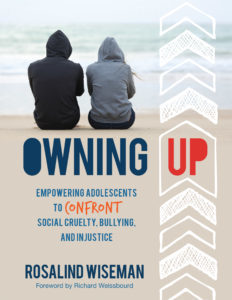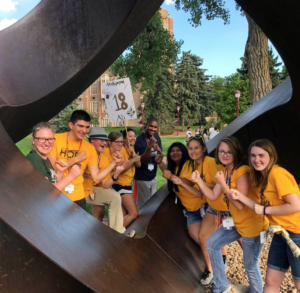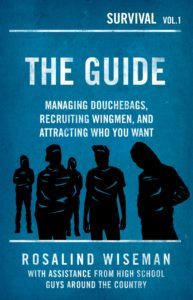Rosalind Wiseman's Blog, page 18
August 20, 2018
Third Space Podcast: Rosalind Wiseman and Tré Garnett on Opening the Conversation
Listen to Cultures of Dignity Founder Rosalind Wiseman and Student Intern Tré Garnett on Third Space Podcast!
It is imperative to bring young people into the conversation when we are making decisions about their world. Young people are the experts on their experiences and should be used as resources. On this episode of Third Space Podcast Rosalind Wiseman and Tré Garnett talk about the power of admitting when adults are wrong and opening up the conversation.
From race and allyship to school shootings and protests, listen to their discussion on how to have truly difficult conversations with young people.
“What’s the bravest conversation that you need to have with a young person. Think about it, prepare for it, and have it.” – Rosalind Wiseman
Third Space is a podcast hosted by Jen Cort, on diversity education with leading experts.
Rosalind Wiseman a teacher, thought leader, author, and media spokesperson. She works on issues of bullying, ethical leadership, the use of social media, and media literacy.
Rosalind is the founder of Cultures of Dignity and is the author of the flexible, dynamic curriculum Owning Up: Empowering Adolescents to Confront Social Cruelty, Bullying, and Injustice.
She is also the author of Queen Bees and Wannabes: Helping Your Daughter Survive Cliques, Gossip, Boyfriends, and the New Realities of Girl World—the groundbreaking, best-selling book that was the basis for the movie Mean Girls.
Tré Garnett is a rising sophomore at the University of Oregon studying Psychology and Political Science. He is interning at Cultures of Dignity helping with research and videography.
Recent Posts
Third Space Podcast: Rosalind Wiseman and Tré Garnett on Opening the Conversation
To Tell Or Not To Tell: How To Respond When Our Kids Confide In Us
Why Teen Guys Need Girl Friends

 Follow
Follow


The post Third Space Podcast: Rosalind Wiseman and Tré Garnett on Opening the Conversation appeared first on Cultures of Dignity.
August 17, 2018
To Tell Or Not To Tell: How To Respond When Our Kids Confide In Us
By Rosalind Wiseman
“Mom – I am going to tell you something but you have to promise not to do anything. Do you promise?”
What parent hasn’t heard that? It’s a no-win situation. If you promise and your child tells you that someone’s health or safety is at risk, you have to break the promise. But then you’ve violated their trust and you may rightfully worry that they won’t tell you anything ever again. If you don’t promise, then your child won’t tell you what’s going on. You’re parenting in the dark and that’s dangerous.
Meanwhile, schools encourage students to tell teachers and administrators when they experience social conflicts, bullying, and other common yet painful problems. Our children are also told to come forward when they see something wrong – we want bystanders to become “upstanders” (a word adults use with only the best of intentions that usually triggers eye rolls with kids and teens).
So when we encourage our kids to report a problem, they look at us like we have lost our minds. No wonder parents are confused.
Here’s the truth people don’t like to talk about: “Telling” is more complex than we like to admit and our children know it.
This is why:
Some kids are really good at getting away with the same behavior that gets somebody else sent to the principal’s office.
There are two parallel justice systems operating in a school: the administration’s version and the students’ version. The administration’s justice system gets kids officially in trouble. But if you’re found guilty in the students’ justice system, the punishment is becoming a social outcast. If you’re labeled a snitch, at the least, there can be social consequences like being ridiculed, excluded, and targeted for other forms of social cruelty, especially on social media. To a young person, that can be the worst punishment.
What do we say when our child comes to us with a problem?
Remind yourself of three things:
Often children are telling their parents because they want comfort.
They don’t necessarily want you to fix the problem.
And they really don’t want you freaking out, calling the school, screaming at parents, and sending emails to both in all capitals.
Remind them of a few things:
Everyone has the right to their feelings. No one gets to say to them, “You just took it the wrong way” or “You’re overreacting.”
People can get accustomed to putting up with bad behavior from others. And if it seems “normal” you usually don’t think you have the right to complain. Even if you did complain, it’s easy to convince yourself that no one would take you seriously.
All of these dynamics can easily trick people to keep quiet and become increasingly miserable
They deserve to be treated with dignity.
Here’s how to start the conversation:
When they say: “I want to tell you something but you have to promise not to do anything”…we say,
I’d love to make that promise but I can’t because you may tell me something where we need to get someone’s help. But I can promise that if I decide another adult needs to be involved, you will know and decide with me who that person is going to be. I can also promise that I will listen to you and be by your side every step of the way.
How do we frame it?
Thanks for telling me what you’re dealing with. It takes a lot of strength. I think I understand why you wouldn’t want to tell adults at school. That said, hoping something goes away doesn’t always make it go away. If you don’t want to tell an adult at school now, I want us to think through some things you can do to take care of yourself. So I am going to ask you a few questions to help figure it out.
Here are some questions to ask:
Has the behavior been going on for awhile? How long has it gone on for?
Have you thought about telling an adult before? Why?
If you decide not to tell now, what would have to happen for you to think you should tell later?
How is this problem impacting your life now?
If they’re a bystander: Do you think someone is being physically or emotionally hurt or socially excluded to the level that the person can’t come to school without worrying about it?
What are your concerns if you do come forward? What’s the worst thing you worry about happening?
If those worries become real, who is the adult you believe would be best to help you address the problem?
I also see why you think that there are positives for staying silent right now. The negatives are that it puts all the power in other people’s hands, and if we don’t come forward, the adults in school can’t help. At some point, I think it’s probably good to give them that chance. Maybe a way to think about this is: who is the person at the school that you trust the most to tell this kind of information to? Why don’t we think about who that would be as the next step right now and decide what would have to happen where you do tell this person what’s going on.
But no matter what, I want you to know how much I respect the fact that you told me and thank you for trusting me to handle this information. You have the right to go to school and feel safe.
So let’s admit how messy it is for our kids to come forward and how truly brave they are when they do it. Let’s give them the support they need to think through the process and make the decision that feels safe.
This piece originally appeared on Parent Toolkit here.
Create your own customizable Back to Schoolkit with incredible resources from experts!
Recent Posts
To Tell Or Not To Tell: How To Respond When Our Kids Confide In Us
Why Teen Guys Need Girl Friends
Meet Carey! Interview with Director of Owning Up Programs

 Follow
Follow


The post To Tell Or Not To Tell: How To Respond When Our Kids Confide In Us appeared first on Cultures of Dignity.
August 6, 2018
Why Teen Guys Need Girl Friends
The following excerpt is from The Guide Chapter 10: What Are Girls Really Thinking? The Guide Managing Douchebags, Recruiting Wingmen, and Attracting Who You Want is a book written by teen guys for teen guys with the assistance of Rosalind Wiseman. The book takes experiences from teenage boys across the country and offers advice on important topics and common problems in teenage guys lives but are rarely talked about.
Do Teen Guys Need To Be Friends With Girls?
For better or worse, there’s no getting around the fact that you live in a world with girls. Even if you go to an all-guys school, at some point you have to study with girls, work with them, argue with them, and compete against them. They can be your friends, people you vaguely know at school, sisters, your enemies, or your girlfriends.
Your high school experience (and your whole life) will go better if girls like you. I don’t mean liking you because they all want to hook up with you, or liking you because you do everything they say or take their side against guys. I mean, if you project internal strength and treat girls with respect, I guarantee the non–drama queen, hot girls will find you attractive.
Let me give you a very specific example that I’m sure you can picture easily. There are always guys who love to point out to girls how boring women’s basketball is. These teen guys are missing the point. Girls hate the debate about what a joke women’s sports are. This hatred isn’t based on the merits of the argument. It’s based on the indisputable fact that the guys who insist on “winning” this argument do it because they get off on putting women down. The only girls who don’t hate this guy are insecure and not worth your time. You want to be the guy who projects confidence (you can even be cocky) but doesn’t put girls down. If you do that, girls will have your back and more.
Believe me, I know the power of girls when they decide they hate a guy. You don’t want to be that guy. There’ll be a time in high school when it’s very handy to have girls on your side.
Here’s what I want you to remember about girls:
Girls can be very confusing to teen guys. Guys can be just as confusing to girls.
You’ll probably get into a situation with a girl where you’ll become incredibly frustrated, if not extremely angry. Remember, if you can’t manage your mind, you can’t manage your mouth. This is when you can get into trouble.
You have hormones. This can complicate your friendships with girls.
By the way, girls have hormones too.
Sometimes hormones get in the way of your friendships.
Whether you’re gay or straight, you could still have every problem I listed above.

Photo by Ba Phi from Pexels
Yes, it’s possible to be friends with girls. It’s also possible (not 100 percent certain, but possible) that one of you will want more than friendship and then you’ll enter into the Friend Zone. There’s more about that later in the chapter.
Here I’ll explain why it’s key to be able to have a close platonic friendship with a girl.
She can explain the girl perspective.
You don’t have to worry about what you say. (If you do, you’ve either just become friends or you like her as more than a friend.)
It can be easier to admit things to a close girl friend than to even your closest guy friends. Why? Because sometimes your male friends can’t deal with you being serious.
She can tell you when you’re being a jackass, but in a way that doesn’t make you feel stupid.
Girls…they really aren’t that bad. Except when they are. Read more for details.
Recent Posts
Why Teen Guys Need Girl Friends
Meet Carey! Interview with Director of Owning Up Programs
10 Tips for Avoiding the “ Perfect Parent ” Trap

 Follow
Follow


The post Why Teen Guys Need Girl Friends appeared first on Cultures of Dignity.
Do Teenage Guys Need To Be Friends With Girls?
The following excerpt is from The Guide Chapter 10: What Are Girls Really Thinking? The Guide Managing Douchebags, Recruiting Wingmen, and Attracting Who You Want is a book written by guys for guys with the assistance of Rosalind Wiseman. The book takes experiences from teenage boys across the country and offers advice on important topics and common problems in teenage guys lives but are rarely talked about.
Do Teenage Guys Need To Be Friends With Girls?
For better or worse, there’s no getting around the fact that you live in a world with girls. Even if you go to an all-guys school, at some point you have to study with girls, work with them, argue with them, and compete against them. They can be your friends, people you vaguely know at school, sisters, your enemies, or your girlfriends.
Your high school experience (and your whole life) will go better if girls like you. I don’t mean liking you because they all want to hook up with you, or liking you because you do everything they say or take their side against guys. I mean, if you project internal strength and treat girls with respect, I guarantee the non–drama queen, hot girls will find you attractive.
Let me give you a very specific example that I’m sure you can picture easily. There are always guys who love to point out to girls how boring women’s basketball is. These guys are missing the point. Girls hate the debate about what a joke women’s sports are. This hatred isn’t based on the merits of the argument. It’s based on the indisputable fact that the guys who insist on “winning” this argument do it because they get off on putting women down. The only girls who don’t hate this guy are insecure and not worth your time. You want to be the guy who projects confidence (you can even be cocky) but doesn’t put girls down. If you do that, girls will have your back and more.
Believe me, I know the power of girls when they decide they hate a guy. You don’t want to be that guy. There’ll be a time in high school when it’s very handy to have girls on your side.
Here’s what I want you to remember about girls:
Girls can be very confusing to guys. Guys can be just as confusing to girls.
You’ll probably get into a situation with a girl where you’ll become incredibly frustrated, if not extremely angry. Remember, if you can’t manage your mind, you can’t manage your mouth. This is when you can get into trouble.
You have hormones. This can complicate your friendships with girls.
By the way, girls have hormones too.
Sometimes hormones get in the way of your friendships.
Whether you’re gay or straight, you could still have every problem I listed above.

Photo by Ba Phi from Pexels
Yes, it’s possible to be friends with girls. It’s also possible (not 100 percent certain, but possible) that one of you will want more than friendship and then you’ll enter into the Friend Zone. There’s more about that later in the chapter.
Here I’ll explain why it’s key to be able to have a close platonic friendship with a girl.
She can explain the girl perspective.
You don’t have to worry about what you say. (If you do, you’ve either just become friends or you like her as more than a friend.)
It can be easier to admit things to a close girl friend than to even your closest guy friends. Why? Because sometimes your male friends can’t deal with you being serious.
She can tell you when you’re being a jackass, but in a way that doesn’t make you feel stupid.
Girls…they really aren’t that bad. Except when they are. Read more for details.
Recent Posts
Do Teenage Guys Need To Be Friends With Girls?
Meet Carey! Interview with Director of Owning Up Programs
10 Tips for Avoiding the “ Perfect Parent ” Trap

 Follow
Follow


The post Do Teenage Guys Need To Be Friends With Girls? appeared first on Cultures of Dignity.
August 1, 2018
Meet Carey! Interview with Director of Owning Up Programs
Carey Goldstein is joining the Cultures of Dignity team as the Director of Owning Up Programs after working in a school as a school counselor for 15 years.
Meet Cultures of Dignity’s newest team member!
Cultures of Dignity: Tell us a little about yourself!
Carey: I live in Louisville, Kentucky with my family. I graduated from American University and got my Masters in Education with a focus on Counseling at Old Dominion. I have spent the majority of my life in Louisville which is where I met my husband, Dan. We have two girls, Elise is 14 and Sally is 12. We love food and music and one of our favorite things to do is cook dinner and dance in the kitchen. If it was up to Elise we would listen to show tunes every night but we try to mix it up as much as possible. Elise and Sally are involved in sports and musical theater and that takes up a lot of our time, which is OK since we are all sports fans that enjoy a good musical!
Cultures of Dignity: How did you get involved in Cultures of Dignity’s work?

Owning Up Curriculum
Carey: I was a school counselor for 15 years and about eight years ago there was a particularly tough group of kids coming through the middle school. As a school, we wanted to figure out a better way to help them navigate all the stuff they were going through. A colleague of mine found an Owning Up training with Rosalind in Washington DC and a few of us signed up to go. It was the first curriculum I found that was down to earth and realistic as well as fitting my personality. I was always trying to avoid falling into old school counselor stereotypes and this curriculum really helped. When we really knew it would work for my school was when the teachers felt comfortable using it as well. We worked together integrating it into the 6th-8th-grade curriculum. The icing on the cake was when the kids liked the classes and started sharing more about their world which helped us help them. I have woven the Owning Up curriculum into my program with both middle and high school kids ever since.
Cultures of Dignity: You have been a counselor for 15 years. What will you miss about it the most?
Carey: The kids. I am really excited about joining the Cultures of Dignity team but I will miss the daily interaction with my students. I worked in a small school and was lucky enough to really get to know my students. I left a school that I truly love. It was the right decision at the right time but I will miss the daily buzz and energy of working in a school.
Cultures of Dignity: Tell us about your experience working with Owning Up in Tanzania?
Carey: Last summer I was lucky enough to participate in a teacher exchange through my school, Louisville Collegiate School, with a school in Arusha, Tanzania. Each year a few teachers go and spend three weeks working with their teachers exchanging best practices and ideas. The Tanzanian people are amazing. They are kind and generous and desperately want to educate their children in the best way possible to help their country move forward and out of poverty. I was able to introduce some small parts of Owning Up to the faculty. Classes like Owning Up are not common in their education system but many educators are beginning to recognize the importance of working with the whole child. In particular, they loved anonymously sharing their armor. Many teachers expressed gratitude for the opportunity to feel connected to their colleagues in a way that they had not previously felt through sharing their armor. As they move towards creating a counseling office I hope to continue to share Owning Up with them. I would love to get back to Tanzania someday!
Cultures of Dignity: As a parent, a school counselor, and now Director of Owning Up Programming for Cultures of Dignity, what is one piece of advice you can give to parents?
Carey: Never, never, never assume the story your child is telling you is the whole story. It never is, no matter how much they swear they have told you everything. There is always something they don’t know or have left out.
Learn more about Owning Up!
Recent Posts
Meet Carey! Interview with Director of Owning Up Programs
10 Tips for Avoiding the “ Perfect Parent ” Trap
Rejection, Relationships, and Reaching Out to your Teenage Daughter

 Follow
Follow


The post Meet Carey! Interview with Director of Owning Up Programs appeared first on Cultures of Dignity.
July 27, 2018
10 Tips for Avoiding the “ Perfect Parent ” Trap
By Rosalind Wiseman
Forget trying to live up to the impossible “ideal parent”. Here are tips to avoid the perfect parent trap.
1. Know your kids, but never assume.
Just like adults, children often show different sides of themselves at school, home, and with their friends. Another parent, teacher, or child could have a valuable perspective on your son/daughter that might never occur to you.
2. Step up to the plate.
Sports are not automatically “male territory,” and there’s no reason a bake sale should be regarded as “women’s work.” Let your children see you stepping up and outside your comfort zone every once in a while.
3. Be aware of your social filters when you speak or act.
Class, religion, race, and economic status all affect the way we view the world around us. Remember that you are not the only one who works, cleans the house, feeds the kids, and still manages to survive Perfect Parent World. Empathy is crucial to being a better communicator.
4. You are not a failure as a parent if you don’t rescue your child from every misstep.
In fact, you might be teaching him or her an essential lesson about integrity and values by not stepping in.
5. Teachers, coaches, and counselors deserve just as much respect for working with your children as you do for being the parent.
No discussion will be productive if you walk into it thinking you know better than they do because you are the parent.
6. Your children will not become social misfits if you refuse to buy them the latest gadget “every other kid in school has.”
It’s important to stick to your core principles on parenting even if that means going against the popular wave every now and then. Saying no to a cell phone will not scar your child for life.

Photo by Jenn Evelyn-Ann on Unsplash
7. Feeling like an outsider at PTA meetings does not excuse you from participation.
You do a disservice to your children if you tell yourself “these parents are too difficult to deal with” or “I don’t fit in” to avoid taking part in key school functions. You also don’t have to commit your entire life in order to make a meaningful contribution. Participating in one volunteer activity a semester is great.
8. Know when to speak up.
Caving into parental peer pressure when you don’t believe your peers are right or choosing to stay out of a conflict because you don’t want to deal with it often permits bullying parents to push their agenda through — and your child is the one who’ll have to live with that.
9. Be open to problems and solutions.
This might seem obvious, but people are prone to see only their side of an issue, especially when it comes to their kids. A willingness to talk through all aspects of a problem, apologize (when necessary), and compromise gives children a model for how to handle their own challenges.
10. There is more than one “right” way to parent.
Forget trying to become the perfect parent and be aware of the times when you hold other parents to this impossible standard. Parental judgment stops parents from being able to work together.
Recent Posts
10 Tips for Avoiding the “ Perfect Parent ” Trap
Rejection, Relationships, and Reaching Out to your Teenage Daughter
What Leadership Taught Me About Looking Back To Move Forward



The post 10 Tips for Avoiding the “ Perfect Parent ” Trap appeared first on Cultures of Dignity.
July 16, 2018
Rejection, Relationships, and Reaching Out to your Teenage Daughter
The following excerpt is from Rosalind Wiseman’s Queen Bees & Wannabes, 3rd Edition: Helping Your Daughter Survive Cliques, Gossip, Boyfriends, and the New Realities of Girl World, where Wiseman gives us a glimpse into the complicated lives of our teenage daughters. This book can help ignite difficult conversations between parents and teens, starting with dignity and empathy.
Rejection, Relationships, and Reaching Out to your Teenage Daughter
For parents, being rejected by your daughter is an excruciating experience.
But it can really make you mad and doubt your child’s sanity when you’re replaced by a group of girls with all the tact, sense of fairness, and social graces of a pack of hyenas.
Most people believe a girl’s task is to get through it, grow up, and put those experiences behind her. But your daughter’s relationships with other girls have deep and far-reaching implications beyond her teen years.
Your daughter’s friendships with other girls are a double-edged sword.
First, let’s talk about the positives. These friendships can be the key to surviving adolescence. Many girls will make it through their teen years precisely because they have the support and care of a few good friends. These are the friendships in which a girl truly feels unconditionally accepted, understood, and sometimes even challenged when she’s doing something that’s not good for her—like dating a guy who doesn’t treat her with respect.
Girls’ friendships are often intense, confusing, frustrating, and humiliating; the joy and security of “best friendships” can be shattered by devastating breakups and betrayals. And beyond the pain in the moment, girls can develop patterns of behavior and expectations for future relationships that stop them from becoming competent, authentic people who are capable of having healthy relationships with others as adults.
But your daughter is too close to it all to realize the good and bad influence of her friends.
She needs guidance from you despite the fact that she’s pulling away. In Queen Bees & Wannabes, my job is to give you my best suggestions for what kind of guidance to give her and how that information should be presented so she listens and your relationship with her is strengthened through the process.
Read more from the latest edition of Queen Bees and Wannabes
GET YOUR COPY
Recent Posts
Rejection, Relationships, and Reaching Out to your Teenage Daughter
What Leadership Taught Me About Looking Back To Move Forward
The Hidden Rules of Brotherhood



The post Rejection, Relationships, and Reaching Out to your Teenage Daughter appeared first on Cultures of Dignity.
July 11, 2018
What Leadership Taught Me About Looking Back To Move Forward
Tré Garnett is a rising sophomore at the University of Oregon. He grew up in Fort Collins, Colorado and as a student at Rocky Mountain High School attended the 2015 Hugh O’Brian Youth (HOBY) Colorado Conference as well as the 2015 HOBY World Leadership Congress, and the 2016 EF Tours Global Leadership Summit alongside other HOBY alumni. He is currently an intern with Cultures of Dignity for the summer!
Learn about HOBY and how it has helped Tré continue to grow in his new role as a group facilitator at the 2018 HOBY Colorado Conference.
What Leadership Taught Me About Looking Back To Move Forward
By Tré Garnett
What would it be like to speak with a younger you? What would you say? What would you want them to know? I faced each of these questions as an assistant facilitator at Hugh O’Brian Youth (HOBY) Leadership’s 2018 Colorado seminar.
HOBY is a global organization created by late actor Hugh O’Brian following his service trip to Africa with humanitarian Dr. Albert Schweitzer. As he prepared to board his plane back to the US, Dr. Schweitzer grabbed his hand, and asked,“Hugh, what are you going to do with this?” This farewell was meant to challenge Hugh to not let his service end when he left Africa. Dr. Schweitzer implored Hugh to continue making an impact. To this end, Hugh founded HOBY to empower young people to lead on a personal, group, and societal scale. In 2018, 60 years after its initial founding, HOBY has grown into a global force for youth leadership; having worked with over 425,000 students to become HOBY ambassadors.
As one such alumnus, I have met students from around the world and learned from incredible charismatic experts such as Dr. Arun Gandhi and Ndaba Mandela. By the end of my experience with HOBY, I have grown into a leader with an incredible new understanding of the world as well as a toolbox full of new skills.

Ambassadors at the 2018 HOBY Colorado Conference
Three years after my own ambassador experience at the University of Denver, , I returned to lead a group of new students on a transformative journey. In this new role, I was in charge of co-facilitating and spending my days with a group of nine high school sophomores who were perhaps a bit confused and overwhelmed as they went through a four-day conference of leadership training, keynote speakers, and loud, if not occasionally silly, cheers. For most of the ambassadors in my group, the HOBY environment was like another world. From the first minute, it was a complete whirlwind with brief moments of downtime. I hoped that I could provide my group of ambassadors with this same experience I had when I was their age. I loved HOBY and created so many powerful bonds through it. However, three years made it hard to remember what it was like to be a wide-eyed sophomore being told that this seminar would change my life in only four days.
I saw the ambassadors’ skepticism and discomfort. I suppose being told that your life was about to change while singing about burritos and baby sharks would create some doubt. I realized my main challenge as a facilitator was how would I bridge the gap between my understanding and love for HOBY with my ambassadors’ apprehension? While I was certainly a bit reluctant when I was in their shoes, I quickly adapted to the high energy of the HOBY environment. Now, I was responsible for helping these young ambassadors recognize their potential and hopefully use it to create positive change, but I could only do that if I worked with these young people to see that program was valuable even if they were experiencing it in a different way than I had.
Being a facilitator was all about showing the ambassadors that there was a powerful and worthwhile experience in front of them if they took a leap into unknown territory to meet it.
Facing this challenge is what made my experience as a facilitator so much more powerful. I sat in the same rooms, did the same cheers, and experienced many of the same lessons as my group, but now I was experiencing it not as a recipient, but as a mentor. I stopped focusing on how keynote speakers or activities struck me and, instead, worried about creating the most impactful experience for my ambassadors. I tried to spend less time internalizing and more time thinking about how I could create profound conversations within my group. Being a facilitator was all about showing the ambassadors that there was a powerful and worthwhile experience in front of them if they took a leap into unknown territory to meet it. Ultimately, despite the initial awkwardness and trepidation, my group did bond and began having deeper dialogues. Lunches which were first filled with awkward silence were replaced with laughing and games. The first activity debriefs which only brought some of my group out of their shells in the beginning were replaced with profound ideas on how to tackle inequity and discussions learning from the lives of one another to better understand how to help one another. I was proud to see them in the HOBY spirit and their experience filled me with nostalgia for my days as an ambassador as well a newfound joy born from the knowledge that they had been positively impacted by their experience.
In those four days, I spoke to my younger self nine times over. In each of these conversations, I realized that what I needed to say was not how they should feel or what experience they should be seeking. Instead, I only needed them to know that this was their own experience and that I would support them in pursuing however they so chose. This is what made the experience organic and real. My group was not forced to follow my path, they were given the opportunity to explore it of their own volition. I was only there to help them along when they needed it. My facilitator role was a new path for me just as attending HOBY was a new path for the ambassadors and we should explore them as best we can while supporting one another in our individual journeys.
If you have questions for Tré, feel free to email curious@culturesofdignity.com
Recent Posts
What Leadership Taught Me About Looking Back To Move Forward
The Hidden Rules of Brotherhood
Caught! How to Reach Out to the Student in Trouble



The post What Leadership Taught Me About Looking Back To Move Forward appeared first on Cultures of Dignity.
July 3, 2018
The Hidden Rules of Brotherhood
The following excerpt is from Chapter 3: The Laws of Brotherhood of The Guide: Managing Douchebags, Recruiting Wingmen, and Attracting Who You Want. The Guide is a book written by guys for guys with the assistance of Rosalind Wiseman. The book takes experiences from teenage boys across the country and offers advice on important topics and common problems in teenage guys lives but are rarely talked about.
The Hidden Rules of Brotherhood
Is there anyone you’d rather just sit on a couch and watch some stupid video on your phone or play games with than your friends? Is there anyone you’ve laughed harder with? Is there anyone who understands you better when something is seriously messed up in your life? Guy after guy I’ve talked to for this book agreed with me. But when guys admit how much they value their friends, they have to make fun of it by draping themselves over each other, pretend-hugging, and proclaiming, “I love you, man!” As Hunter says, “I know it’s ridiculous, but we have to lisp when we say something emotional. We’re just way too insecure with ourselves to show our feelings any other way.”
Life is better—way better—with friends. For guys who don’t have close friends (even if it looks like they have tons of friends), it can feel incredibly lonely. But friendships are complicated. Things aren’t always going to go smoothly. And even though conflict is inevitable, even with your closest friends, Guy World doesn’t allow that. Guys are supposed to let everything roll off their backs or throw a few punches and then forget about it.
 No disrespect, but that’s stupid and unfair to you. You can’t go through life thinking that the only two options you have when you’re angry are squashing your feelings and punching people. Your life is way more complex. Think about it: Have you ever been really angry at someone, thought of the perfect thing to say to get your point across … but never actually confronted him? Or if you did say something, he turned your words around or did something else that made you regret bringing it up?
No disrespect, but that’s stupid and unfair to you. You can’t go through life thinking that the only two options you have when you’re angry are squashing your feelings and punching people. Your life is way more complex. Think about it: Have you ever been really angry at someone, thought of the perfect thing to say to get your point across … but never actually confronted him? Or if you did say something, he turned your words around or did something else that made you regret bringing it up?
Let’s take a moment and compare conflict between guys to how it goes with girls. You’ve probably seen how girls interact. From the outside, it looks incredibly intense. They’re inseparable, they constantly analyze their friendships with each other, they fight about things that may make no sense to you, and then they hug in the hallway the next day. Some girls will even try to drag you into their conflicts (which is to be avoided at all costs).
Most guys’ response is, “Girls are insane. I’ll never understand them, and even if I did know what they’re so intense/upset/angry about, I’m sure it’s totally irrelevant or blown out of proportion.” These experiences may give you the impression that girls’ relationships and friendships with each other are more complicated and filled with conflict than yours. I disagree. Why?
Because one unwritten rule in Guy World is that a guy, even a close friend, can be as rude as possible and the other guy can’t get upset. If he does get upset, then another unwritten rule is that he can be made fun of even more. If Guy World were a democracy—meaning, each guy had an equal right to go after the other guy—then things would be fine. But that’s not what’s usually going on. Instead, the combination of the ALMB (Act Like A Man Box) and the boy roles combine to control who goes after whom. Now that you know what you’re up against, you need to integrate that knowledge with a strategy to give you more control.
Read the rest of Chapter 3 in The Guide.
Recent Posts
The Hidden Rules of Brotherhood
Caught! How to Reach Out to the Student in Trouble
Meet Tré! Interview with Summer Intern



The post The Hidden Rules of Brotherhood appeared first on Cultures of Dignity.
July 2, 2018
Caught! How to Reach Out to the Student in Trouble
By Rosalind Wiseman
Students are going to get into trouble. They are going to make mistakes. They are going to hurt others—including saying and doing things that make other students feel unsafe or unwelcome at school. Schools constantly advise children that “it’s safe to tell” and that they should report other students’ bad behavior to teachers, counselors and administrators. But as I wrote about in a previous essay, adults need to remember that a student’s decision “to tell” is complicated. From worrying about social alienation and possible physical threat if you’re labeled a snitch to getting in trouble yourself, students usually don’t want to report on another student.
But what adults rarely think about, and should, is what it feels like to be the student who is told on.
We need to remember what the experience of getting in trouble is like. It doesn’t excuse anyone’s bad behavior to acknowledge that being reported on is anxiety-producing and often causes anger, resentment and sometimes even a desire for revenge. And the consequences of students of color, LGBTQ students and students with disabilities who get into trouble are often disproportionate (i.e. more severe) than their peers, which justifiably can make them perceive school discipline as unfair, hostile and hypocritical.
We also need to remember that it’s expected and understandable that students feel defensive when someone reports them for bullying or other bad behavior. Feeling remorse and taking responsibility for their actions when they have hurt someone requires self-reflection. Yet, self-reflection requires some time and a sense of vulnerability. It’s also common to feel embarrassed, not only because the student worries about what other students think, but also how teachers and parents will judge their actions.
That’s challenging under the best of circumstances. But in today’s social media-driven culture, our students are often getting into trouble in an environment where everyone knows their business, judges their guilt, comments on it and taunts them because of it. In a world where 95% of teens have smartphones and almost half say they are online “almost constantly,” the chatter about why they got into trouble and what they’re going to do about it is a conversation happening in digital spaces 24/7. Students who have reported or who have been reported on can understandably feel that there is no way the school can protect them from the attacks of others who, in turn, now may feel justified to “right” the wrong.
In order to provide opportunities for young people to learn from their mistakes, we need to empathize with how stressful, scary and powerless all of this can feel. Helping a child take responsibility for their actions is at the foundation of educators’ compassion and patience, especially if the child is in trouble because another child reported them and is now blaming that child as the reason they are in trouble.
It’s only after we create this mindset for ourselves that we an approach the student effectively—to help them release enough of their anger and defensiveness so they can begin the process of self-reflection.
Key insights to share with students:
It’s going to take time. They are in the process of figuring out how they got into the situation they are currently facing.
They have every right to their feelings, whatever those feelings are.
Their anger will probably come in waves. When they have those feelings, identify one or two ways to process those feelings in healthy ways and not focus on revenge and retribution.
They may know that the person who reported them is also guilty of something. For example, maybe the person who reported them has been cruel to others or joined in when others were doing it. But that fact doesn’t take away from their own actions that led to trouble.
There may be other people who did the same bad thing but didn’t get caught.
If they believe they are being disciplined unfairly or disproportionately, that is an important issue that needs to be addressed. But it should be brought up to the school administration and not “taken out” on anyone else, like the person who reported them.
It all comes down to this: they got into trouble for their actions, not because someone reported on them. This is probably the most important lesson for young people to learn and it will probably take time for them to come to terms with it.
What are good questions to help young people self-reflect?
The following questions can be addressed in a one-on-one conversation, writing reflection or using art if that is the student’s preferred form of expression.
Did I realize at the time that what I was doing was hurtful or harmful?
If I didn’t realize what I was doing was hurtful or harmful, why didn’t I? How can I recognize when I am doing something hurtful in the future, even if I don’t think it’s a big deal?
What words do I use to describe myself, my goals, my values, and what I want to achieve? Do these align with my actions? Why or why not?
What would my future self (i.e. me in three months) say about how I am responding to this situation?
What is my family or the people I respect going to think about what I did and how I am handling the situation now?
How do I feel about what I did?
How can I handle the situation in a way that I can be proud of, that makes the problem smaller (instead of bigger) and gets me closer to achieving the goals I have for myself?
To have the best chance of success, we have to acknowledge that these situations take place in the context of many young people’s anger, anxiety and conflicting needs. We need to keep the person who reported safe. We need to give the person who broke the rule the time and space to come to terms with their actions while giving them appropriate consequences. And we need to communicate standards about how the wider school community’s involvement contributes to or compromises the culture of dignity, respect and inclusion. If we keep these in mind, these experiences can show students what it means to be held accountable in a compassionate, respectful manner.
So remember….students are going to make mistakes. They are going to hurt others, including saying and doing things that make the school feel unsafe or unwelcome for other students. Our responsibility is to create school cultures that uphold the dignity of all students while we hold them accountable and clearly communicate and embody our values.
This article originally appeared onRosalind’s Classroom Conversations on ADL.
Recent Posts
Caught! How to Reach Out to the Student in Trouble
Meet Tré! Interview with Summer Intern
What’s The Difference Between Dignity and Respect?



The post Caught! How to Reach Out to the Student in Trouble appeared first on Cultures of Dignity.






